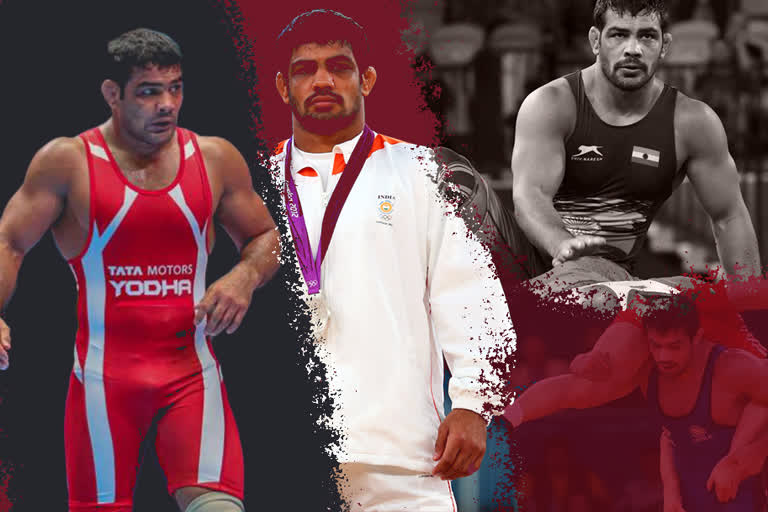Hyderabad: Indian sports fraternity has been in a state of dystrophy of late. It has been doomed and disappointed by the dramatic twist in the life of one of its celebrated sporting luminaries, Sushil Kumar.
Arguably India’s most eminent athlete from the Olympic sports arena, wrestler Sushil Kumar has now been spending nights behind the bar after being arrested by the Delhi Police for his alleged link in the murder case of former junior national champion, Sagar Dhankar, a 23-year-old wrestler.
On May 5, Dhankar succumbed to severe physical assault after Sushil and his four aides allegedly beat him with hockey sticks over a putative property dispute at the Chhatrasal Stadium, the power centre of Indian wrestling.
The killing of the young gun rocked Indian wrestling like anything. It has brought the behind the scenes mischievous life of Sushil into the light while exposing the ugly underbelly of Indian wrestling.
For the last two decades, Sushil had been the face of Indian wrestling. He gave the sport an identity that it needed and inspired hundreds of youngsters to take it up and make India proud on the world stage.
Being India’s only athlete to win two individual medals in the Olympics, he was revered in every stratum of society. In a country that had won just two individual medals in the previous millennium, Sushil’s was a huge achievement. In the 2008 Beijing Olympics, he ended India’s 56 years jinx for a wrestling medal. The last medal, a bronze, came in the 1952 Olympics when Khashaba Dadasaheb Jadhav clinched India's first medal in the Helsinki Games.
Four years later, Sushil improved upon his Beijing feat, winning silver. He missed the gold by a whisker since he had suffered from a stomach bug before the final bout in London.
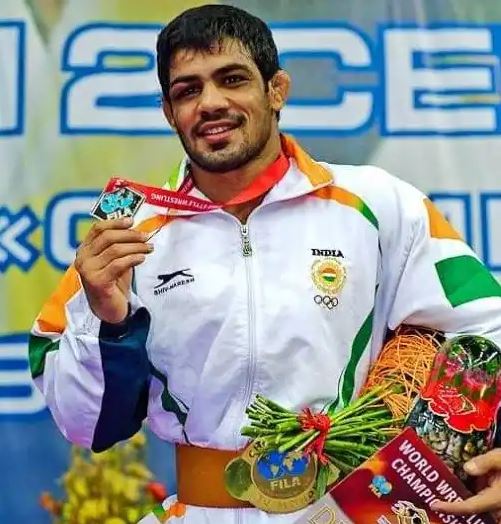
Two years back, in 2010, he achieved another first for India, this time; winning the Wrestling World Championships gold in Moscow.
With these three solid performances, Sushil earned legendary status for himself and cemented his legacy in wrestling. He became the ultimate man to look forward to for budding wrestlers in India.
For his fabled feats, Sushil was lavishly rewarded by the Indian government. He was accorded Rajiv Gandhi Khel Ratna, the country's highest sports award, and Padma Shri, the fourth highest civilian award of India. These awards and international success earned him crores of rupees from the government, making him one of the few wealthy athletes of the country from the Olympic spectrum.
It was majorly due to Sushil, India has today emerged as a major force to reckon with in international wrestling.
But as the idol of thousands of budding wrestlers was paraded by the Delhi Police last week, with his face hidden behind a nondescript towel Sushil’s years of hard work, discipline and dedication have seemingly gone for a toss.
Rags to Riches
Sushil’s inspiring rise from being a village boy hailed from Delhi’s Baprola to making podium finishes in the top-notch international events such as the Olympics, Asian Games, Commonwealth Games, Asian Championships and World Championships, notwithstanding, presents one of the most famous rags to riches story in Indian sports.
Being a champion athlete, he inspired many youths, who never dared to aim for big things. It was mainly because of Sushil that Ravi Dahiya, Deepak Punia and Bajrang Punia have stepped into wrestling, and now, they are well set for their Olympics glory.
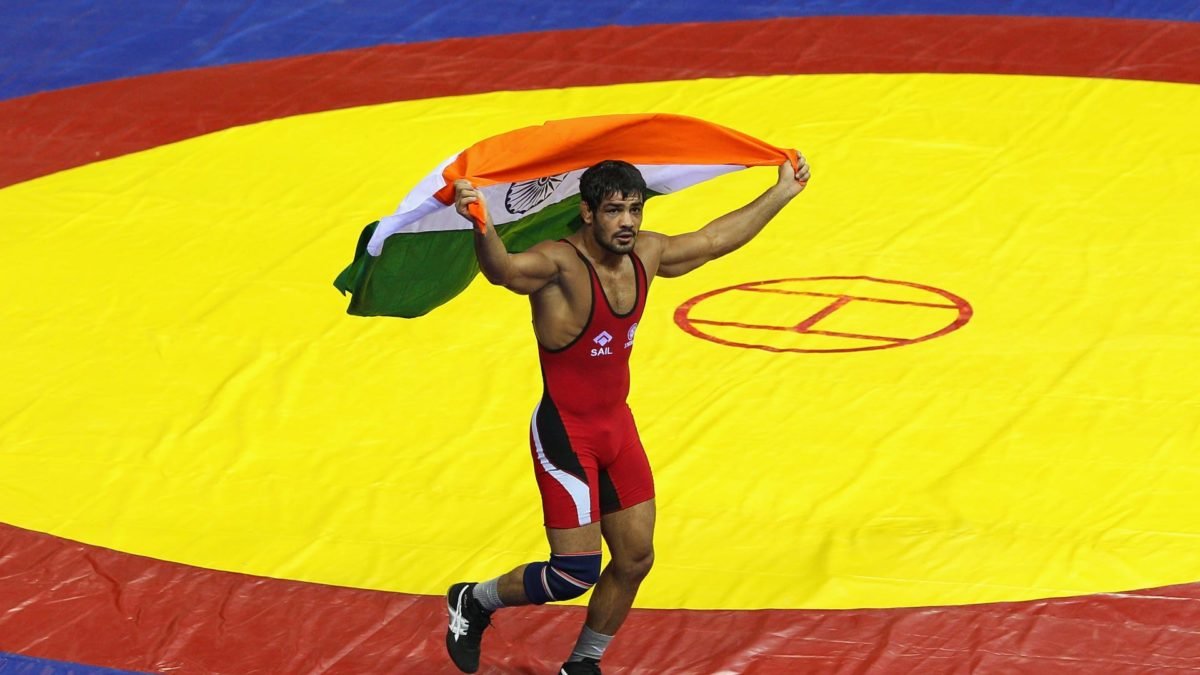
It will not be out of place to say that they would not have reached this level had Sushil not showed them the way as the pioneer of the game.
Sushil dared to be a champion, and he broke many barriers in his way to be a world-beater. While grappling on the mat, he enlightened his successors to aim for the holy grail of wrestling.
Sports are meant for such inspiring stories. It is a great leveller. It doesn’t judge anyone based on their race, caste and colour. Sushil is the best example of it.
Sushil enrolled himself at Chhatrasal Stadium at the age of 14 under coach Satpal Singh. Years later, after reaching the peak of his career, Sushil paid Singh Gurudakshina, marrying his daughter Savi Kumar.
He was born poor, but that didn’t hinder his rise to stardom.
Wrestling took him to the top echelon of Indian sports before the imminent fall that put him behind the bar.
The hope is now that late wrestler Sagar Dhankar would get justice, but will Sushil be able to come clean?
Though Sushil, a three-time CWG gold medallist, is under trial now, his behaviour raised questions: if he was innocent or if he was not involved in the murder of Sagar Dhankar, then why he was absconding from the law?
There is a popular saying, "success makes you forget why you started in the first place”. Sushil might have forgotten his roots and what he has learnt from the sport under the weight of 17 gold medals that he won at various prestigious tournaments during his two decades old career.
Star turns 'Gangster'
The May 4 incident, hence, is not a freak one. It is, in fact, the climax of an underworld drama in which Sushil was the main protagonist.
In December 2017, Sushil Kumar was booked by Delhi Police for disrupting the selection trial for the 2018 Asian Games at the Indira Gandhi Stadium. He and his rival group led by former wrestler Parveen Rana got engaged in threatening and beating. Rana came off the worst in the fight, receiving physical blows. As he filed a complaint, police detained Sushil.
However, it must be noted that Sushil’s life was not that complicated even though he became a legend in his trade after becoming a double Olympic medallist. But things started changing after he won the gold medal in the 2014 Glasgow CWG. It was his career’s eighth gold which he followed up with nine more.
After the Glasgow CWG, Sushil started taking an interest in business. His priority changed; his focus has shifted from wrestling.
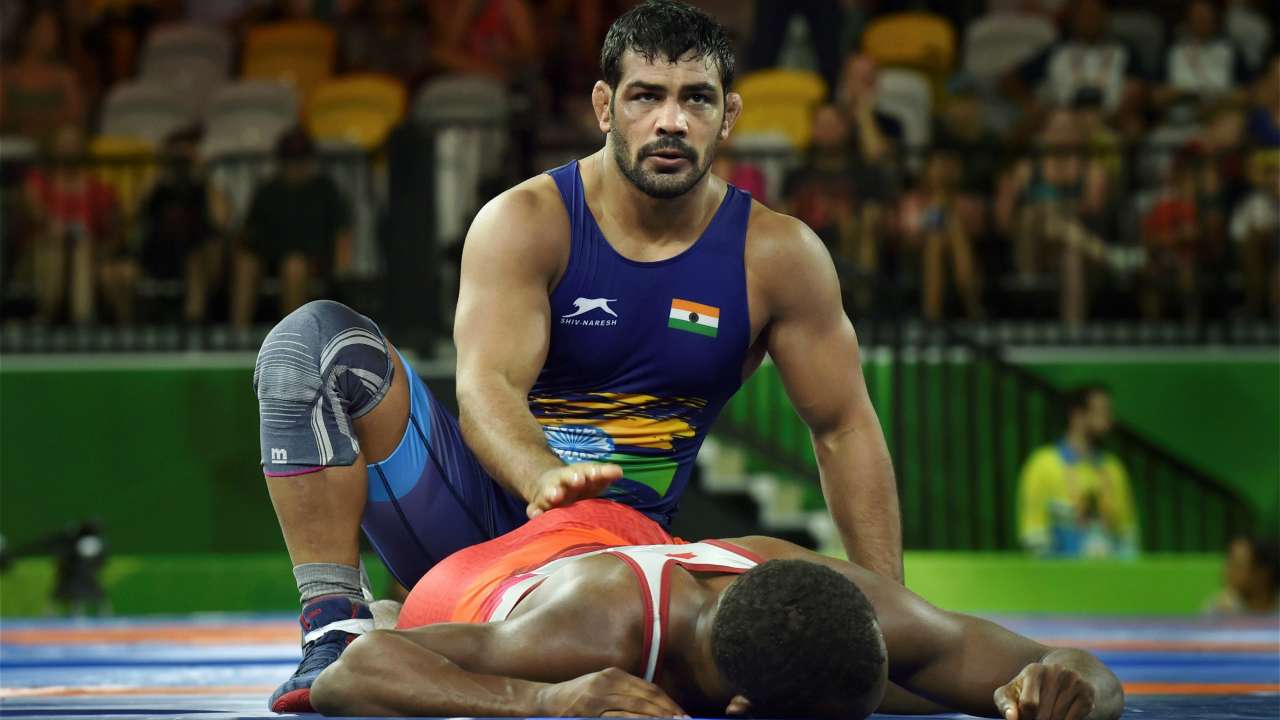
But as he was a celebrated wrestler, his followers had increased manifold. He had employed those failed wrestlers to guard the toll plazas at state borders. He ran Ayurveda stores for a famous FMCG company, and then came close to power.
Being the most respected and renowned name at the Chhatrasal Stadium, his words were considered final in almost everything. There was nobody who could object to his misdeeds. His coach Satpal Singh, being his father-in-law, never protested although he was the in-charge of the stadium.
At his safe haven, Sushil ran his business dealings and continued with his practice simultaneously. He had turned the stadium into his mini kingdom.
Over time, he had formed his own group and was in control of the stadium. Every morning until the May 4 incident, Sushil would enter the stadium along with his boys with young wrestlers awaiting him to touch his feet and seek his blessings. All wanted to be like him, a champion wrestler.
But Sushil is not the only one who has been involved in such unethical and unsporting acts; many wrestlers play and work as musclemen after the mat time gets over. Wrestling has always been close to power. Neither the Wrestling Federation of India (WFI) nor the Delhi Police, despite being aware of criminal activities at the Chhatrasal Stadium, took a step to clear the spiritual centre of Indian wrestling from the thugs.
Being a product of the system, Sushil followed the unwritten rule of the sport portraying himself as the messiah for banks who have debts to recover, politicians with evil ambitions and dreaded property owners. In return, he earned crores of rupees.
Sushil pehlwan gradually started finding himself in the company of all the wrong people, who had nothing to do with wrestling. Nobody warned him. He was used by everyone whenever required. Those who were once regular visitors to Sushil at the stadium have concealed their faces now.
From the sporting point of view, Sushil had never been close to his best in the last four years. After missing the Rio Olympics berth to Narsingh Yadav, he got indulged in an ugly tussle with the latter. Soon after qualifying for the Games, Yadav failed the dope test for which he was banned for four years. He alleged that Sushil's followers mixed "something" in his food during his stay at the Chhatrasal Stadium. Surprisingly, Yadav's allegation had never been investigated seriously by the WFI. Instead, Sushil was given an administrative role at the academy which further fortified his clutch over the akhara.
In the 2018 Asian Games qualifiers, Sushil lost in the first round which marked the beginning of his great fall. In 2019, in the 2020 Olympics qualifiers, he once again lost in the first round in Nur Sultan. Yet Sushil didn't give up. To prove himself, he had put himself under severe body pain. He had even hired a personal coach from Russia, but still, he couldn't qualify for the Tokyo Olympics.
Now after the arrest, his dream of making a comeback is, apparently, all but over. It could put his legacy to the test. Sushil, who is now at the twilight of his career at 38, has already been at the wrong urn of WFI.
Shortly after he was arrested WFI assistant secretary Vinod Tomar put the blame gun on his shoulder washing off the federation's role.
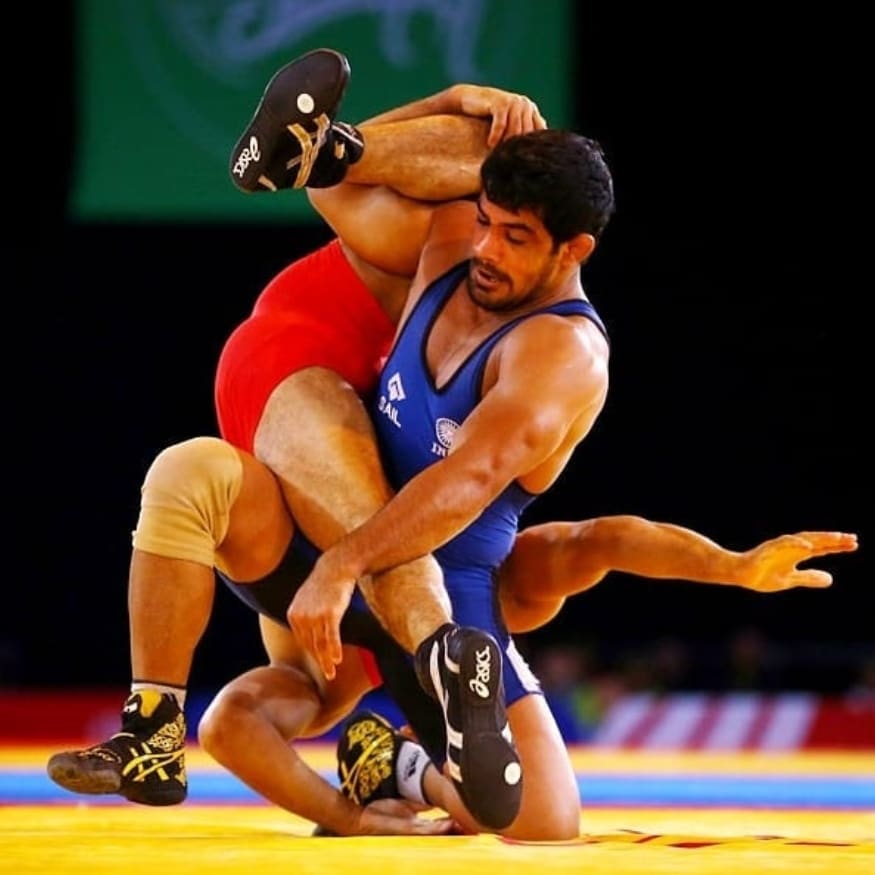
Tomar said Sushil’s actions had brought bad press to the Indian wrestling. But WFI itself is headed by a man with multiple criminal charges. As per his 2014 election affidavit, Brij Bhushan Sharan Singh, a BJP Member of Parliament from Kaiserganj, Uttar Pradesh, has been charged in numerous criminal cases, including an attempt to murder and dacoity.
Image Rusted
In Tokyo 2020, India will expect medals from Dahiya, Deepak and Bajrang. All of them are Chhatrasal alumni, and they honed their skills in order to emulate Sushil's success. They have been consistent in the past four years, so expecting a medal each from them would not be an unrealistic expectation.
But now, as the Chhatrasal Stadium tragedy has tarnished the image of wrestling, they will have an invisible enemy to beat, disgrace, apart from continuing training amid the challenging pandemic.
At the same time, the Sagar Dhankar murder case might have a serious effect on wrestlers in the coming time. They may lose faith in the sport, which they held close to their hearts, for the transgressions involved in it.
Sushil’s fall from fame, which exposed the wrongdoings that go on behind the wrestling mat, could prove to be a disaster for the sport, with one after other frightened trainees refusing to train at the haunted Chhatrasal Stadium after Dhankar's murder in broad daylight.
Therefore, Sagar Dhankar should be accorded justice, and the akhara must be cleared of all evil things to ensure that the holy hub of Indian wrestling restoring its sanctity.
For Sushil, only time will tell if his legendary status will be intact or he will be remembered as a dreaded criminal.
